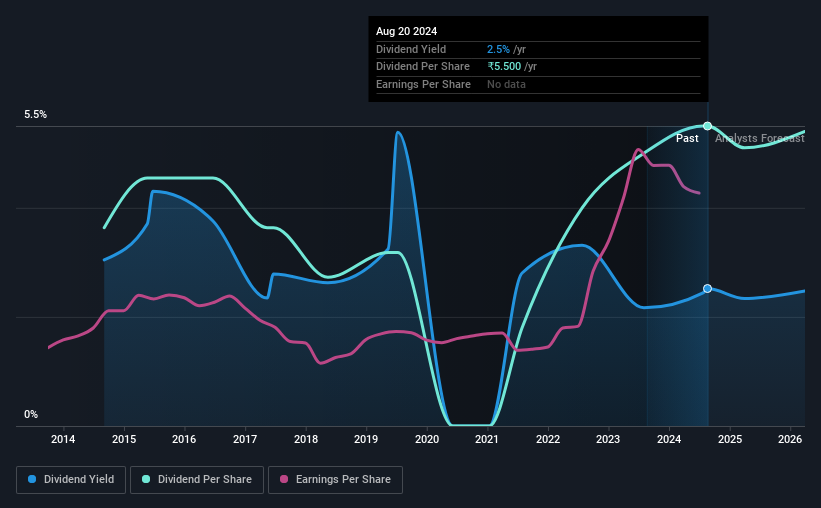Karnataka Bank (NSE:KTKBANK) Is Paying Out A Larger Dividend Than Last Year
The Karnataka Bank Limited (NSE:KTKBANK) will increase its dividend from last year's comparable payment on the 10th of October to ₹5.50. This makes the dividend yield 2.5%, which is above the industry average.
Check out our latest analysis for Karnataka Bank
Karnataka Bank's Dividend Forecasted To Be Well Covered By Earnings
Impressive dividend yields are good, but this doesn't matter much if the payments can't be sustained.
Karnataka Bank has established itself as a dividend paying company with over 10 years history of distributing earnings to shareholders. While past data isn't a guarantee for the future, Karnataka Bank's latest earnings report puts its payout ratio at 14%, showing that the company can pay out its dividends comfortably.
The next year is set to see EPS grow by 6.6%. Assuming the dividend continues along recent trends, we think the future payout ratio could be 15% by next year, which is in a pretty sustainable range.

Dividend Volatility
While the company has been paying a dividend for a long time, it has cut the dividend at least once in the last 10 years. The annual payment during the last 10 years was ₹3.64 in 2014, and the most recent fiscal year payment was ₹5.50. This implies that the company grew its distributions at a yearly rate of about 4.2% over that duration. We're glad to see the dividend has risen, but with a limited rate of growth and fluctuations in the payments the total shareholder return may be limited.
The Dividend Looks Likely To Grow
With a relatively unstable dividend, it's even more important to evaluate if earnings per share is growing, which could point to a growing dividend in the future. Karnataka Bank has seen EPS rising for the last five years, at 18% per annum. Growth in EPS bodes well for the dividend, as does the low payout ratio that the company is currently reporting.
We should note that Karnataka Bank has issued stock equal to 21% of shares outstanding. Trying to grow the dividend when issuing new shares reminds us of the ancient Greek tale of Sisyphus - perpetually pushing a boulder uphill. Companies that consistently issue new shares are often suboptimal from a dividend perspective.
We Really Like Karnataka Bank's Dividend
In summary, it is always positive to see the dividend being increased, and we are particularly pleased with its overall sustainability. Earnings are easily covering distributions, and the company is generating plenty of cash. Taking this all into consideration, this looks like it could be a good dividend opportunity.
Market movements attest to how highly valued a consistent dividend policy is compared to one which is more unpredictable. At the same time, there are other factors our readers should be conscious of before pouring capital into a stock. As an example, we've identified 2 warning signs for Karnataka Bank that you should be aware of before investing. Looking for more high-yielding dividend ideas? Try our collection of strong dividend payers.
Valuation is complex, but we're here to simplify it.
Discover if Karnataka Bank might be undervalued or overvalued with our detailed analysis, featuring fair value estimates, potential risks, dividends, insider trades, and its financial condition.
Access Free AnalysisHave feedback on this article? Concerned about the content? Get in touch with us directly. Alternatively, email editorial-team (at) simplywallst.com.
This article by Simply Wall St is general in nature. We provide commentary based on historical data and analyst forecasts only using an unbiased methodology and our articles are not intended to be financial advice. It does not constitute a recommendation to buy or sell any stock, and does not take account of your objectives, or your financial situation. We aim to bring you long-term focused analysis driven by fundamental data. Note that our analysis may not factor in the latest price-sensitive company announcements or qualitative material. Simply Wall St has no position in any stocks mentioned.
About NSEI:KTKBANK
Undervalued established dividend payer.
Similar Companies
Market Insights
Community Narratives




